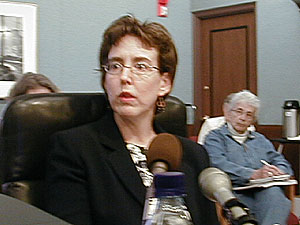|
Photos
Your Voice
|
Legislative Auditor wants tighter rules for charter schools
June 26, 2003
 |
| Deborah Junod of the Office of the Legislative Auditor told state lawmakers that too many charter schools open before they're ready to manage their business operations (MPR Photo/Tim Pugmire) |
St. Paul, Minn. — The nation's first charter school opened in Minnesota in 1992. There are now 77 charter schools operating in the state, with another 11 scheduled to open this fall. But Deborah Junod of the Office of the Legislative Auditor told state lawmakers that too many of the independent public schools open before they're ready to manage their business operations.
"When a charter school applies, the charter school developers need to lay out a basic budget and an administrative plan," Junod said. "Insuring that these plans are fully implemented, and that schools have the systems in place that they need is an area that we think is falling through the cracks."
Charter schools are operated by teachers and parents and sponsored by a school district, university or non-profit organization. The schools receive state money for each student but without many of the rules and requirements faced in traditional public schools. In theory, that additional freedom allows more classroom innovations. It doesn't, however, relieve them of the need to balance the books.
Junod says one fourth of the charter schools in business last year had a negative or low fund balance. She blames the problems on poor financial planning and insufficient monitoring of spending and revenues.
|
We aren't building institutions with huge fund balances. We really don't want to.
- Steve Dess, Minnesota Association of Charter Schools |
"For example, several of the the school boards had not adopted budgets until well into the school year," Junod said. "Some used unrealistic assumptions in developing their budgets, particularly regarding enrollment. One school had adopted a deficit budget two years in a row expecting that fundraising would fill the gap, and that didn't materialize."
Junod says the percentage of charters with financial problems is actually about the same for traditional public school districts. However, the report suggests tougher accountability for charter schools. One recommendation is for state lawmakers to allow for contract termination when schools repeatedly fail to meet financial reporting deadlines.
Another calls on the state Education Department to better define the responsibilities of a charter school sponsor. The report also wants the agency to ensure financial systems are in place before charter schools open.
Assistant Commissioner Chas Anderson says the department is already responding to the needs of charter schools with a new office of choice and innovation.
"The changes we have made offer a one kind of stop point for charter schools call and get information from that wasn't there previously," Anderson said. "Secondly, it allows more individual attention to charter schools, particularly those facing financial difficulties."
Steve Dess, executive director of the Minnesota Association of Charter Schools, says the report will help schools continue to make improvements. He says charter school leaders are spending money with their students in mind.
"We aren't building institutions with huge fund balances," Dess said. "We really don't want to. These folks that are operating these schools want to take the resources as much as possible and get them into use the year they need them for those kids that they're providing the services for. So, I think they're doing this in a healthy way, they'll always be tight operations, and therefore having to manage their resources carefully."
The legislative auditor's evaluation echoes many of the problems raised in the past by Rep. Matt Entenza, DFL-St.Paul, who has spent the past three years exposing cases of fiscal mismanagement in charter schools. Entenza issued a statement saying the report validates his longstanding concerns. He also plans to push legislation next session to implement the report's recommendations.
|
News Headlines
|
Related Subjects
|
